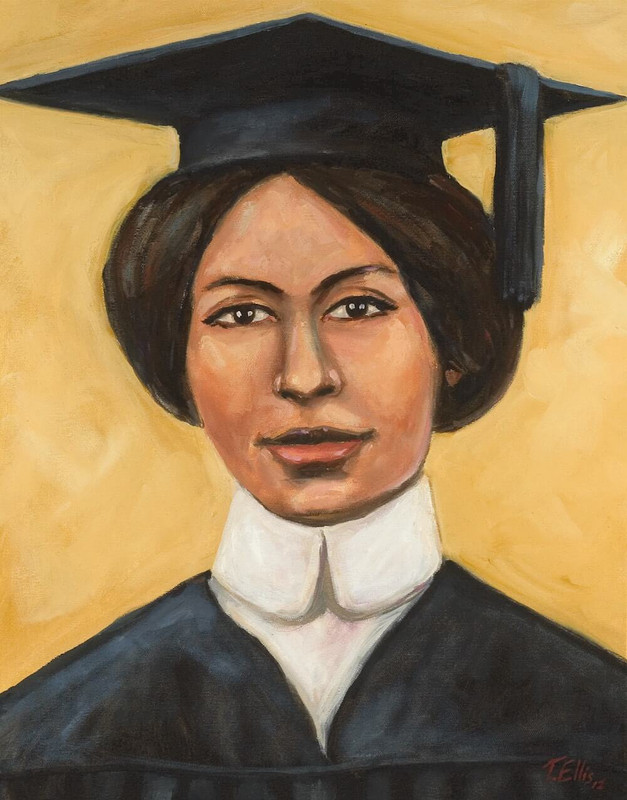1889 - 1990
By: Rene Haynes | Date Added:

Bertha Pitts Campbell was born on June 30, 1889 and expired on April 2, 1990, she was from Winfield, Kansas, United States. She was a civil rights activist and one of the 22 founding members of Delta Sigma Theta Sorority, Inc. established at Howard University in Washington D.C. Her grandmother, Eliza Butler, she was a former slave. Campbell was the only black student enrolled in Montrose High School located in Montrose, Colorado when she delivered the valedictorian address to the class of 1908. Upon graduation Campbell was offered a four-year scholarship to Colorado College. Campbell declined the scholarship and chose instead to enroll in Howard University in Washington, D.C. in 1908 where she received financial support from the Congregational Church. In 1913 she co-founded Delta Sigma Theta and took part in a women's suffrage march in Washington, D.C. In June of that year she graduated cum laude from Howard University with a Bachelor of Arts degree in education. She then taught for two years in Topeka, Kansas and then returned to Howard to assist in the women's dormitory. Returning to Colorado, she met and married Earl Pitts, a railroad worker and later government worker, in 1917. The couple moved to Seattle in 1923 when Earl Campbell found employment at the Immigration Station there. Unfortunately, years later, Earl died of a heart attack in 1954. That year in 1923, Campbell was instrumental in forming the Alpha Omicron chapter of Delta Sigma Theta Sorority in Seattle. As a wife and mother of one son, Campbell still found time to volunteer in the community, helping to organize the Seattle Urban League in the early 1930s and serving on its first board. She worked with the Phillis Wheatley branch of the Young Women's Christian Association (YWCA) before the present East Cherry Branch was established. In 1936, she became the first black woman ever to exercise the right to vote on the local YWCA board and served four terms as chairperson of the East Cherry Branch. She was an active member of the YWCA for 53 years. Campbell observed many discriminatory practices in Seattle. Black women could not eat in Frederick and Nelson's Tea Room, nor could they try on gloves in the department store. Many cemeteries, roller-skating rinks, restaurants, and swimming pools discriminated against African Americans. At the beginning of World War II, black people arriving in the city of Seattle, had difficulty finding homes. In Seattle, Campbell was a committed activist and organizer. She was a charter member of the Christian Friends for Racial Equality, an organization which worked to expand housing and other opportunities for the black community until 1965, when the civil rights movement was in full swing. Then, with many other groups working in the field, the organization disbanded. As a member of the First African Methodist Episcopal Church, Campbell fought to bring about change through Christian human service efforts. In 1942, she and a group of women from the Council of Churches formed the Christian Friends for Racial Equality, an organization dedicated to change through persuasion, based on Christian principles. The organization worked to ensure that physicians did not refuse service to black people in hospitals, and to roll back discriminatory practices elsewhere. For example, Campbell's organization conducted a housing survey in the University District, listing the number of places willing to rent to black people. In 1949, 38 places were available but only 6 would rent to people of color. At age 92, Campbell led 10,000 members of her Delta Sigma Theta sorority in a march down Pennsylvania Avenue in Washington, D.C. to commemorate the participation of the organization in the suffrage march of 1913. Having long survived her husband and son. On her 100th birthday, she was feted at her retirement home and received praise and visits from friends and political leaders from the city, county, and state. The King County Council declared it to be Bertha Pitts Campbell Day throughout the county. She spent her final years in a Seattle nursing home Bertha Pitts Campbell expired on April 2, 1990. Members of her sorority from around the nation came to her funeral to express their high regard for her life. The Washington State House of Representatives honored Campbell for her life and work on May 11, 1987, and she stood in the gallery to accept the honor. In turn, Seattle proclaimed June 13, 1987, as Bertha Pitts Campbell Day. In 2018 and 2019, the Northwest African American Museum featured an exhibition on Campbell and Mona Humphries Bailey, the 17th president of Delta Sigma Theta.
click hereShare your thoughts on this story with us. Your comments will not be made public.
Email
Copyright ©2016 - Design By Bureau Blank